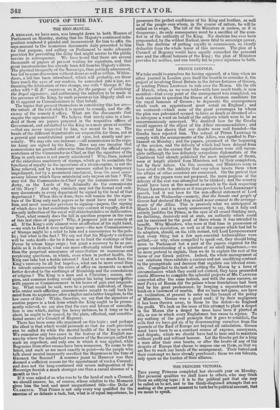PRINCE LEOPOLD.
Wz take credit to ourselves for having opposed, at a time when no other journal in London gave itself the trouble to consider it, the project of involving Great Britain in the future fortunes of Greece, by sending Prince LEOPOLD to rule over the Morea. On the 6th of March, when, as we were told—with how much truth, is now manifest—that every point of the arrangement was completed, We took occasion to question the fitness of a German candidate for the royal honours of Greece ; to deprecate the consequences which such an appointment must entail on England ; and we ventured—which none of the great personages by whom the plan was patronized seemed to have so much as dreamed of— to interpose a word on behalf of the subjects which were to be so unceremoniously conveyed. We doubted how far the Greeks would approve of the object of the Allies' recommendation ; and the event has shown that our doubts were well founded—the Greeks have rejected him. The refusal of Prince LEOPOLD to comply with the arrangements of the Allies, was signified to Par- liament on Monday ; and the papers, promised at the beginning of the session, and the delivery of which had been delayed from day to day, on the excuse that the negotiations were still incom- plete (although the less delicately scrupulous diplomatists of the Continent had already published the most important of them), were at length elicited from Ministers, not by their completion, but by their failure. On this occasion, our Ministers seem to have acted with the infelicity that very often besets them when the affairs of other countries are concerned. On the pretext that some of the papers were not prepared, the main purpose of the delivery of the rest was attempted to be blinked ; and the country would have been at this moment as much in the dark respecting Prince LEOPOLD'S motives as it was previous to Lord ABERDEEN'S speech, had it not been for the non-official statement of Lord DURHAM on Wednesday--namely, that the Senate and people of Greece had declared that they would never consent to the arrange- ments of the Allies. This is precisely what we anticipated in March last ; and it is surely unnecessary to say, that it fully and entirely justifies the Prince, in the eyes of all sound thinking men, for declining, decisively and at once, an authority which could not be exercised for the good of those whom it was intended to benefit. Why Ministers, who were at that time in possession of the Prince's resolution, as well as of the causes which had led to its adoption, should, on the I Gth instant, tell Lord LONDONDERRY that every thing but a few non-essential technicalities were settled,—or why, when compelled to speak out, they should bring down to Parliament but a part of the papers required for the proper understanding of a question of no small importance,—wo no more pretend to explain, than we do to explain the rest of the tissue of our Greek politics. Indeed, the whole management of our relations there exhibits a curious and not unedifying contrast to the promptitude and decision that regulate our internal coun- cils. Compelled to the task of settling the Morea by a force of circumstances which they could not control, they have proceeded invita Minerva to complete the splendid projects of Mr. CANNING somewhat after the same fashion, and with the same success, as mad PAUL of Russia did the palace whose foundations had been laid by his great predecessor, by heaping a superstructure of brick on a basement of marble. But we have not space, nor have we inclination, at present to enter on this branch of the policy of Ministers. Greece was a good card ; if by their negligence it has been thrown away, to them be the defeat—to England the profit. We look on the issue of this attempt to plant a despot in the Morea (for a despot he must have been if planted at all), as one in which every Englishman has cause to rejoice. To say nothing of .the great principle that it goes to establish, the evils that we have got rid of by disconnecting ourselves from the quarrels of the East of Europe are beyond all calculation. Greece must have been to us a constant source of expense, annoyance, and dispute, which we should have had to bear and to maintain without profit and without honour. Let the Greeks get for a king a man after their own hearts, or after the hearts of any of the despots of Europe that choose to impose one on them, so that we are free to wash our hands of the arrangement. Their hatred and their contempt we have already purchased: these we can tolerate, only spare us the burden of their alliance.


























 Previous page
Previous page